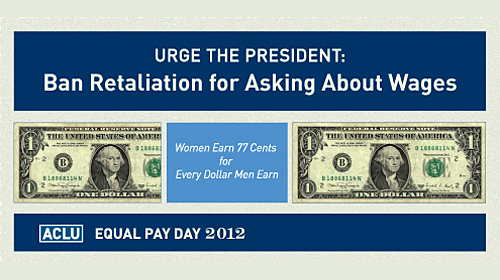
Yesterday, on a procedural vote, the U.S. Senate failed to reach the 60 votes needed for the , a bill intended to update the Equal Pay Act of 1963, to move forward. Unfortunately, the means more delay for an already long overdue measure to ensure that women receive equal pay for equal work. In 1963, the year that Congress passed the , women earned . Although we will celebrate the 49th anniversary of the Equal Pay Act on June 10, the disparity continues: today, women, on average, earn only for every dollar their male counterparts take home, and for women of color, the .
The majority of people across all political parties support pay equity, so it is particularly disheartening that yesterday a minority of Senators blocked, along partisan lines, the Paycheck Fairness Act from further consideration. Until recent years, the Senate had a proud history of passing major civil rights laws with bipartisan majorities. Hard-working Americans deserve no less now.
Women need concrete tools to combat wage discriminationโand the would ensure that women have the tools they need. This common-sense bill would bar retaliation against workers who ask about their employersโ pay practices or inquire about their own wages. It would allow women to receive the same remedies for sex-based pay discrimination that are currently available to those subjected to discrimination based on race and ethnicity. The bill also would provide technical assistance to employers and important safeguards for small businesses.
So after yesterdayโs vote, what next?
In the face of Congressional inaction, we know the Obama Administration will continue their very strong support of this issue. One of the things that could be done, as we continue to press for legislative reforms, is that the President could sign an executive order to protect people who work for against retaliation for disclosing or asking about their wages. According to the Institute for Womenโs Policy Research, of American workplaces either discourage or specifically prohibit employees from discussing pay practices.
While this would not reach as many workers as the Paycheck Fairness Act would, this executive order would have the critical effect of banning retaliation against the 26 million people in America who work for federal contractors when trying to determine if they are being paid fairly. Women cannot do anything about discrimination, if they donโt know it is occurring. This is only right in workplaces receiving federal dollars, and would signal a step in the right direction for women and families who deserve the opportunity to take home the pay that they have rightfully earned.
For over 70 years, presidents of both parties have who work in companies that contract with the federal government. These protections have often paved the way for expanded protections for all workers.
We hope that the 50th anniversary of the Equal Pay Act next year will be a happier one. The ภฯฐฤรลฟชฝฑฝแน๛ will continue to fight for legislation that ensures equal pay for equal work for all American workersโand in the interim, that would set an example of equality and fair pay in the workplace.
Learn more about pay discrimination: Sign up for breaking news alerts, , and .

